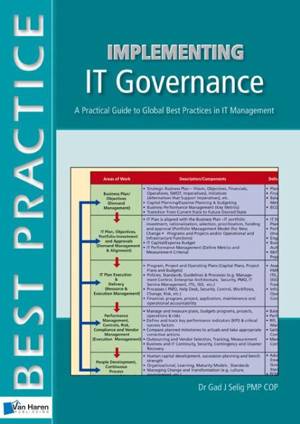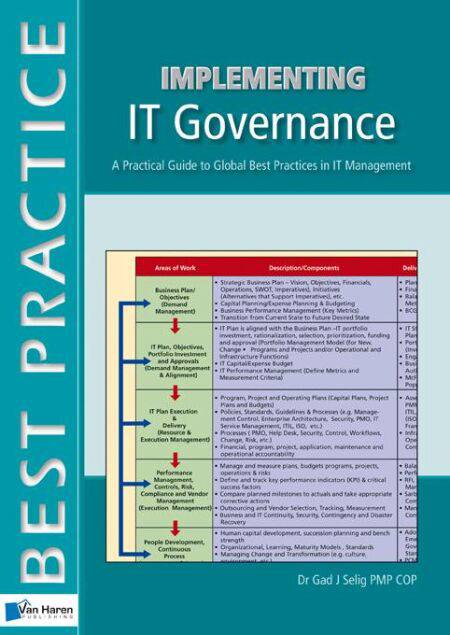
Je cadeautjes zeker op tijd in huis hebben voor de feestdagen? Kom langs in onze winkels en vind het perfecte geschenk!
- Afhalen na 1 uur in een winkel met voorraad
- Gratis thuislevering in België vanaf € 30
- Ruim aanbod met 7 miljoen producten
Je cadeautjes zeker op tijd in huis hebben voor de feestdagen? Kom langs in onze winkels en vind het perfecte geschenk!
- Afhalen na 1 uur in een winkel met voorraad
- Gratis thuislevering in België vanaf € 30
- Ruim aanbod met 7 miljoen producten
Zoeken
Implementing IT Governance E-BOOK
A Practical Guide to Global Best Practices in IT Management
Gad J. Selig
E-book | Engels
€ 49,00
+ 49 punten
Omschrijving
The issues, opportunities and challenges of aligning information technology more closely with an organization and effectively governing an organizations Information Technology (IT) investments, resources, major initiatives and superior uninterrupted service is becoming a major concern of the Board and executive management in enterprises on a global basis. An integrated and comprehensive approach to the alignment, planning, execution and governance of IT and its resources has become critical to more effectively align, integrate, invest, measure, deploy, service and sustain the strategic and tactical direction and value proposition of IT in support of organizations.
Much has been written and documented about the individual components of IT Governance such as strategic planning, demand (portfolio investment) management, program and project management, IT service management and delivery, strategic sourcing and outsourcing, performance management and metrics, like the balanced scorecard, compliance and others. Much less has been written about a comprehensive and integrated IT/Business Alignment, Planning, Execution and Governance approach. This new title fills that need in the marketplace and gives readers a structured and practical solutions using the best of the best principles available today.
The book is divided into nine chapters, which cover the three critical pillars necessary to develop, execute and sustain a robust and effective IT governance environment - leadership and proactive people and change agents, flexible and scalable processes and enabling technology. Each of the chapters also covers one or more of the following action oriented topics: demand management and alignment (the why and what of IT strategic planning, portfolio investment management, decision authority, etc.); execution management (includes the how - Program/Project Management, IT Service Management with IT Infrastructure Library (ITIL) and Strategic Sourcing and outsourcing); performance, risk and contingency management (e.g. includes COBIT, the balanced scorecard and other metrics and controls); and leadership, teams and people skills.
Much has been written and documented about the individual components of IT Governance such as strategic planning, demand (portfolio investment) management, program and project management, IT service management and delivery, strategic sourcing and outsourcing, performance management and metrics, like the balanced scorecard, compliance and others. Much less has been written about a comprehensive and integrated IT/Business Alignment, Planning, Execution and Governance approach. This new title fills that need in the marketplace and gives readers a structured and practical solutions using the best of the best principles available today.
The book is divided into nine chapters, which cover the three critical pillars necessary to develop, execute and sustain a robust and effective IT governance environment - leadership and proactive people and change agents, flexible and scalable processes and enabling technology. Each of the chapters also covers one or more of the following action oriented topics: demand management and alignment (the why and what of IT strategic planning, portfolio investment management, decision authority, etc.); execution management (includes the how - Program/Project Management, IT Service Management with IT Infrastructure Library (ITIL) and Strategic Sourcing and outsourcing); performance, risk and contingency management (e.g. includes COBIT, the balanced scorecard and other metrics and controls); and leadership, teams and people skills.
Specificaties
Betrokkenen
- Auteur(s):
- Uitgeverij:
Inhoud
- Aantal bladzijden:
- 1
- Taal:
- Engels
Eigenschappen
- Productcode (EAN):
- 9789087537746
- Verschijningsdatum:
- 26/02/2013
- Uitvoering:
- E-book
- Beveiligd met:
- Digital watermarking
- Formaat:

Alleen bij Standaard Boekhandel
+ 49 punten op je klantenkaart van Standaard Boekhandel
Beoordelingen
We publiceren alleen reviews die voldoen aan de voorwaarden voor reviews. Bekijk onze voorwaarden voor reviews.









